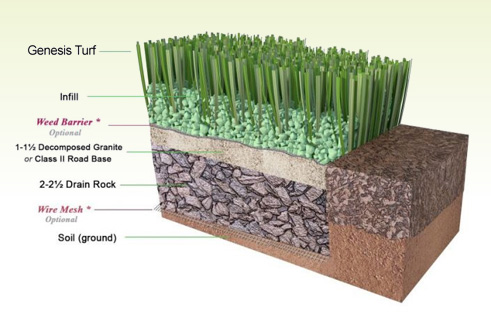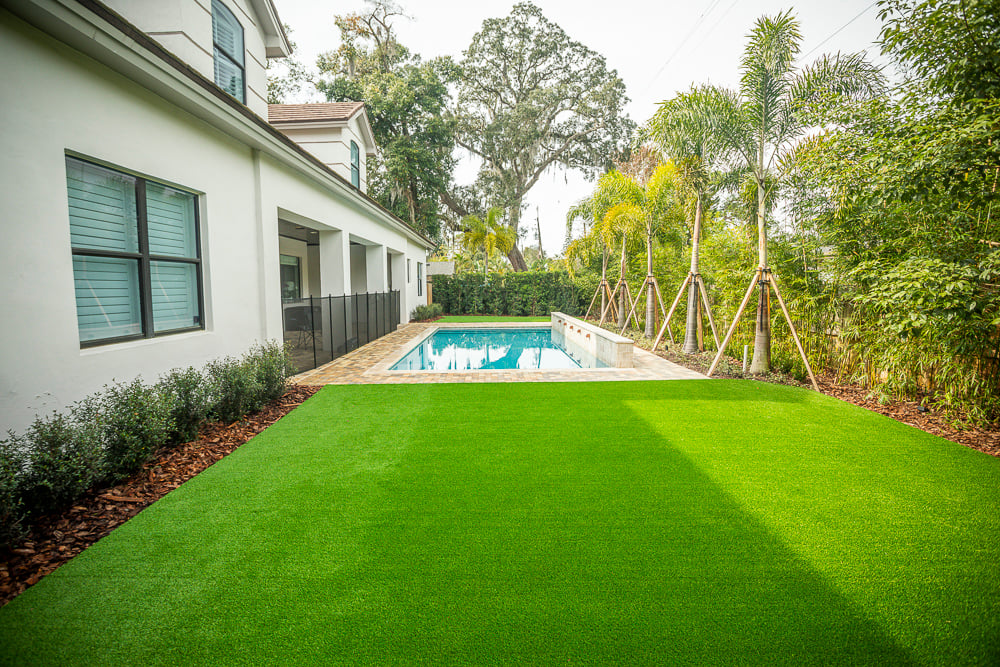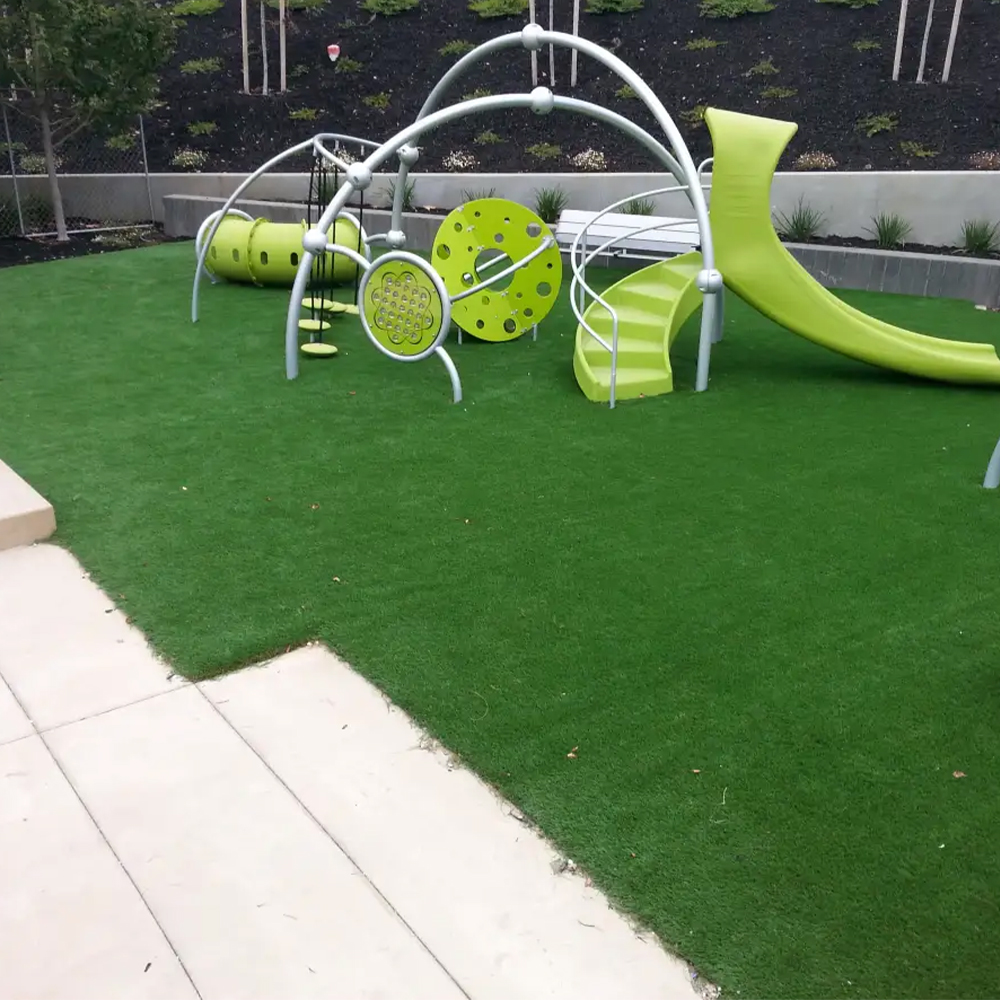Eco-Friendly Arizona Artificial Turf for a All-Season Lush Green Lawn
Eco-Friendly Arizona Artificial Turf for a All-Season Lush Green Lawn
Blog Article
Delve Into the Environmental Advantages of Opting for Synthetic Grass Solutions
The adoption of artificial turf solutions presents a compelling chance to attend to pressing ecological difficulties. By substantially decreasing water use and minimizing the application of dangerous chemicals, these choices not just advertise sustainable landscaping yet additionally safeguard neighborhood ecological communities. Moreover, the reduced carbon impact connected with decreased upkeep tasks adds to a more lasting technique to land monitoring. The effects of these advantages prolong beyond mere conservation efforts, raising concerns about their long-term effect on habitat preservation and general ecological balance. Checking out these measurements discloses a complicated interplay worth considering.
Water Conservation Advantages
Among the most considerable advantages of synthetic grass is its capacity to conserve water. Traditional turf lawns need substantial watering, specifically in areas prone to dry spell or water restrictions. In contrast, artificial lawn does not require watering, significantly minimizing the total need for water sources. This function is particularly useful in arid regions where water deficiency is a pressing worry.
By removing the requirement for normal watering, man-made lawn adds to lasting landscape methods and assists mitigate the ecological effect of excessive water usage. In addition, the preservation of water reaches the reduction of overflow, which can result in soil disintegration and waterway contamination.
In addition, the installment of fabricated turf allows communities and house owners to assign water resources more successfully, concentrating on important uses such as alcohol consumption water and farming. The change in the direction of man-made grass not only promotes accountable water usage but likewise aligns with more comprehensive ecological goals focused on preserving natural resources.
As areas increasingly focus on sustainability, the water conservation advantages of fabricated grass offer a compelling case for its fostering in domestic and business landscape design projects.
Minimized Chemical Usage
The shift to man-made lawn significantly decreases the dependence on chemical therapies typically made use of in all-natural lawn maintenance. Standard grass management commonly entails the application of plant foods, pesticides, and herbicides to promote development and control insects. These chemicals can pose threats to human health and wellness, neighborhood wild animals, and the setting, adding to dirt and water contamination.
In contrast, synthetic grass removes the requirement for these unsafe materials. Once mounted, it calls for very little maintenance, primarily consisting of regular cleaning and infrequent infill replenishment. This reduction in chemical use not only profits the instant setting yet also adds to broader eco-friendly stability. By decreasing the launch of artificial compounds right into the environment, synthetic grass promotes healthier dirt and water systems.
Additionally, the absence of chemical runoff associated with synthetic grass installments aids safeguard local waterways from pollution, sustaining water life and keeping biodiversity. Arizona turf. As areas progressively focus on lasting techniques, selecting synthetic grass provides a sensible remedy that straightens with environmental preservation goals. Through this shift, homeowner can delight in rich eco-friendly areas without endangering ecological health and wellness, paving the way for a more sustainable future
Lower Carbon Impact

Additionally, the installment of synthetic grass can lead to significant water preservation. Natural yards need significant amounts of water for watering, which not just includes to the carbon impact connected with water extraction and therapy but additionally pressures local water sources. On the other hand, synthetic grass requires marginal upkeep, requiring no watering, thus dramatically lowering water usage and its connected energy costs.
Furthermore, the longevity of synthetic grass adds to its lower carbon influence. With a lifespan of approximately 15 years or more, the requirement for constant substitutes Get the facts is decreased, leading to much less waste and reduced power consumption in production and throwing away my company typical yard options. In general, synthetic grass presents a lasting option for eco conscious landscaping.
Habitat Preservation
Habitat preservation is a critical factor to consider in the dispute over landscape design selections, especially when contrasting synthetic grass to all-natural turf. All-natural yard yards usually call for considerable maintenance, consisting of making use of herbicides, chemicals, and fertilizers, which can negatively affect local communities. These chemicals can leach into the dirt and rivers, harming indigenous flora and animals and disrupting local environments.
On the other hand, man-made lawn offers a chance to minimize the eco-friendly impact of landscape design. By going with artificial turf, homeowners can reduce the interruption of all-natural environments connected with standard grass treatment methods. Artificial turf eliminates the need for unsafe chemicals, thus shielding neighboring wild animals and keeping the integrity of surrounding environments. The setup of man-made turf can lead to the conversion of former turf locations right into more biodiverse landscapes, such as pollinator gardens or native plant locations, which can sustain neighborhood wildlife.
Inevitably, the transition to synthetic grass not only conserves water and lowers maintenance efforts yet additionally fosters a more harmonious partnership in between human tasks and the native environment, promoting habitat conservation while doing so.
Long-Term Sustainability
Lasting sustainability is a critical factor in examining the advantages of artificial lawn over standard yard yards. One of the most significant advantages of synthetic grass is its toughness; it can last as much as 15-20 years with minimal maintenance, whereas all-natural grass needs frequent reseeding and substitute. This longevity decreases the need for consistent resources, such as water, fertilizers, and chemicals, which are crucial for keeping a healthy grass lawn.
Additionally, synthetic grass adds to a reduction in carbon discharges related to yard treatment equipment. Traditional yards usually call for gas-powered lawn mowers, leaners, and blowers, all of which contribute to air pollution. Turf installation phoenix az. On the other hand, man-made grass removes the demand for such tools, promoting a cleaner atmosphere
In addition, the production of synthetic grass significantly uses recycled products, enhancing its sustainability account. As important site suppliers adopt eco-friendly techniques, the ecological footprint of fabricated grass remains to decrease.

Verdict
The fostering of synthetic grass solutions provides significant ecological benefits, including significant water preservation, lowered dependence on hazardous chemicals, and a reduced carbon impact. Fabricated lawn help in protecting all-natural environments by minimizing land disruption and promoting lasting sustainability through the use of long lasting products. Collectively, these variables underscore the capacity of fabricated grass to add positively to ecological health and wellness and provide a feasible alternative to conventional landscaping methods in an increasingly resource-conscious globe.
In contrast, artificial lawn does not need watering, dramatically reducing the total demand for water sources. By minimizing the launch of synthetic compounds right into the community, man-made grass promotes much healthier soil and water systems.
Additionally, the installation of artificial lawn can result in substantial water conservation. In comparison, man-made grass requires very little maintenance, needing no watering, thereby dramatically decreasing water usage and its associated energy costs.

Report this page